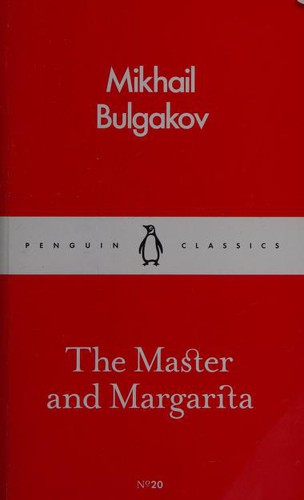4thace reviewed The Master and Margarita by Richard Pevear (Pocket Penguins)
A work by a gifted writer living under oppressive conditions
I first read this book about 25 years ago with a copy that was lent to me by my dear friend Michael who is a Russian emigre. My impression at the time was that though I could see there were passages of great invention and artistry, on the whole I found it baffling book. I didn't understand a lot of the situations and characters in it so I had a hard time seeing it as the work of a genius. One of the greatest books of the Soviet period. I wanted to give it another chance so I picked up this audiobook version.
The action involves a large cast of strange and idiosyncratic characters representing different roles in Soviet society. They struggle and suffer and engage in farcical actions in order to endure their lives. Fear of being caught with foreign currency in defiance of the law is juxtaposed with a yearning for foreign trade goods. There are scenes of degradation and cruelty as they reach for things that are beyond their ability to attain, whether for economic or political reasons. When one character is killed there is considerable interest in the vacancy he leaves behind in his apartment building.
And among the more or less ordinary Muscovites there are a number of enigmatic characters: the satanic character of Woland, his demonic associates, Azazello, Behemoth, and Koroviev, who capitalize upon the disorder and chaos in society. These powerful individuals have inscrutable motives, not intending to cause harm out of hatred but simply amplifying the nature of Russian society. I think these demons are supposed to be beyond our understanding but what they do and how we react to them is really the point of this part of the book.
The Master of the book's title is an author who suffers anxiety and pain as he struggles to bring his novel to the world. Margarita is the woman who has total loyalty to him and his work. The difficulty of the writing the Master finds mirrors the experience of the author himself who wrote this work in secret and could not publish it because of totalitarianism. These two characters share a love we admire for its purity and nobility which brings them to a higher plane by the end of the book.
The episodes set in twentieth century Moscow are interspersed with a number which are set in ancient Israel. For there is a book within the book, where the main character is the Romen procurator of Judea, Pontius Pilate, at the time of the trial and execution of Jesus. Pilate has no great love for those he has power over, or for those who make up his family, with the exception of his faithful dog. Despite himself he becomes fascinated by the weak and simple prophet figure, who is completely devoted to the conviction that there are no bad people at all in this world, despite all appearances to the contrary. It's not an orthodox treatment of Christianity, but a fresh and realistic account of what might have happened. The one faithful follower of Jesus, Matthew Levi, behaves as if delusional and this loyalty reminds us of the one binding the Master and Margarita.
There are parallels between the characters' relationships in the two plot lines of the book, similarities in the themes explored. Both main stories culminate in a death, but the conclusions one is led to draw are quite different between the two. The style of writing describing each scene varies in a virtuosic way that adds to the pleasure of reading the story. I picked up on a poetic, ethereal tone at the very end, which I found touching. The audiobook narration definitely played this up and made it so much more accessible in my opinion. I am glad I came back to this work, even though it didn't end up being my very favorite book, because of the sheer inventiveness on exhibit.

